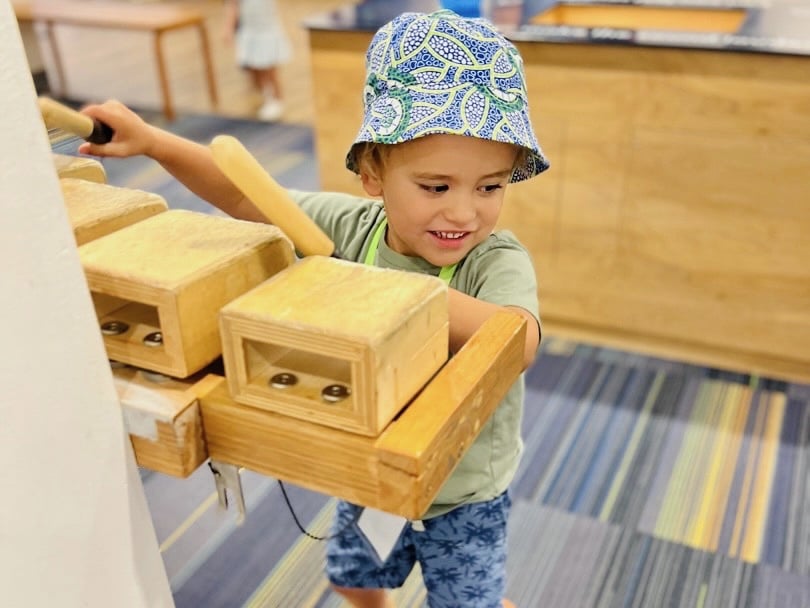“Play extends beyond the learning and development of cognitive, physical, language, social, and literacy skills; it is the ideal opportunity for children to thrive.”
What You’ll Learn
- What is play?
- Why is play important?
- What does play look like at SolBe?
- How can I support my child’s play at home?
At SolBe, we are driven to create the most nurturing, positive, and holistic experience for your child.
We believe that children deserve hands-on exploration opportunities to discover and explore their interests. This belief directly aligns with our play-based approach, which is designed to offer children different sensory, physical and cognitive experiences. Here is what we believe is important to remember about play and how you can support this experience at home!
Play is…
Play is defined by several theorists as a critical component of children’s early learning experiences. Jean Piaget’s theory of play suggests that children’s play and intellectual development are intertwined. Lev Vygotsky similarly described play as a “learning activity” and believed that imaginary play, specifically, is vital to children’s cognitive, social, and emotional development. He believed in play being the main focus of helping children. Dr. Maria Montessori believed that “play is the work of the child.” Montessori theorized that children learn best through play based in reality and play that encourages the use of all five senses.
While these are just a few of the many different theories of play, there is a general consensus that play is an integral part of a child’s development. In its simplest forms, however, play is an intrinsically-motivated activity that often results in joyful discovery.
The Power of Play
The Center on the Developing Child at Harvard University (2019) identifies three core principles that guide us towards helping children thrive. These include:
- Supporting responsive relationships
- Strengthening core life skills
- Reducing sources of stress
Play is the ideal avenue to support all three of these principles. Play extends beyond the learning and development of cognitive, physical, language, social, and literacy skills; it is the ideal opportunity for children to thrive.
Play:
- Enhances brain structure and function.
- Builds active, healthy bodies and is a great way to increase physical activity levels.
- Is creative.
- Supports the development of safe, stable, and nurturing relationships.
- Is an expression of views, experiences, and even frustrations.
- Allows children the opportunity to gain a fuller understanding of their perspective.
- Is therapeutic.
- Helps to regulate the body’s stress response.
- Builds self-confidence and self-advocacy skills.
- Is simple and complex.
- Is varied—symbolic, sociodramatic, functional, games with rules, and more.
- Supports positive peer interactions.
- Helps children adjust to the school setting.
Play at SolBe
SolBe believes that all children and families can thrive. SolBe also believes that intentional opportunities for play can influence this. We know that play profoundly shapes the performance of the human brain, at every age. We also know that play correlates with creativity, imaginative problem-solving, resilience, and the capacity to learn from making a mess of things. At SolBe, play is work and work is play. Joyful learning is valued and encouraged through play, for children and adults alike.
Supporting your Child’s Play
Parents and caregivers have a unique opportunity to provide nurturing and positive play experiences at home. Play does not have to include expensive or elaborate toys—simply observing or joining your child in their play will allow you to see the world from their perspective and help you develop your own playful mindset. Play is most beneficial when caring and trusting adults are involved. We encourage you to offer opportunities of unstructured and structured play that contain possibilities for leading, exploring, and enjoying. Remember, simplicity is the key, and your gentle, nurturing guidance is enough.
Empowering Takeaways
- Play can offer children a variety of sensory, physical and cognitive experiences.
- Play is a simple joy that all humans need and deserve.
- Play supports responsive relationships, strengthens core life skills, and reduces sources of stress.
- Play is an opportunity to thrive.
Be vibrant and keep thriving!
This article was last reviewed or updated on September 29, 2023.
References
Bratton, S. C., Ray, D., Rhine, T., & Jones, E. (2005). The efficacy of play therapy with children: A meta-analytic review of treatment outcomes. Professional Psychology: Research and Practice, 36(4), 376-390.
Center on the Developing Child. (2019). Play in early childhood: The role of play in any setting. https://developingchild.harvard.edu/resources/play-in-early-childhood-the-role-of-play-in-any-setting/
Ginsburg, K. (2007). The importance of play in promoting healthy child development and maintaining strong parent-child bonds. American Academy of Pediatrics, 119(1), 182-191.
Mardell, B., Ryan, J., Krechevsky, M., Baker, M., Schulz, S., Constant Y. L. (2023). A pedagogy of play: Supporting playful learning in classrooms and schools. Project Zero, Harvard Graduate School of Education.
Perryman, K. L., Robinson, S., Bower, L., & Massengale, B. (2020). Child-centered play therapy and academic achievement: A prevention-based model. International Journal of Play Therapy, 29(2), 104-117.
Waldorf Early Childhood Association of North America. (n.d.). The child at work and play. https://waldorfearlychildhood.org/parents-and-families/the-child-at-work-and-play/
Washington, V. & Andrews, J.D. (Eds.) (2010). Children of 2020: Creating a better tomorrow. National Association for the Education of Young Children.
Yogman, M., Garner, A., Hutchinson, J., Hirsh-Pasek, K., & Golinkoff, R. M. (2018). The power of play: A pediatric role in enhancing development in young children. American Academy of Pediatrics, 142(3), 1-17.



